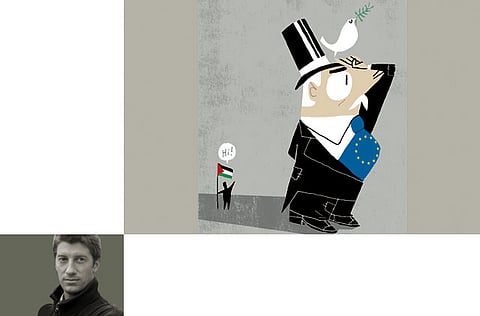What is EU doing for peace in Palestine?
Beyond the basic moral argument, and in line with the reason it won the Nobel peace prize, Brussels should really encourage trade in return for peace

Despite the current crises within different member states of the European Union, the creation of such a supra-national body to encourage trade, social cohesion, and political unity is without a doubt an incredible achievement.
Regardless of the pros and cons of creating a homogenous proto-European and the heavy bureaucratic structure of the overpaid institutions that are each day more and more distant from the majority of citizens who are outside the Brussels bubble, the EU has successfully created a peaceful ambiance to avoid the devastations of war.
However, the insistence in creating an insular system that self-operates has made the fiscal systems of members less flexible and more susceptible to national debt and dependence on Brussels and the richer countries. This would not be the case if the EU had a more engaging and vibrant foreign policy. But instead, the trio of the Council, Commission and Parliament has slowed the decision-making process to a crawl because all motions must be passed unanimously, which means that members still operate largely bilaterally in their national foreign affairs.
There is a certain irony to the slowness of EU foreign policy — if it operated faster it would achieve more results and since the consolidation of the EU and its convoluted foreign policy are all about trade and prosperity this acceleration of the decision-making process would be in its interest because it would achieve greater trade with its neighbours. But the EU’s foreign policy is still nearly entirely dependent on Nato and above all in line with Washington’s perspective on the world. This is most blatant with regards to Iran and Israel.
Europeans would benefit more from opening trade with Iran particularly with regards to importing cheaper oil and gas, whereas the status quo now makes Europeans increasingly dependent on Russia. Instead, Brussels follows Washington’s lead and slaps more sanctions on the Islamic Republic in the hope that it will devalue its currency to such a degree that the population will rise up again and topple the irascible religious regime. All this largely because Israel does not want to see Iran achieve nuclear parity.
The answer to Iran is to have international monitors ensure that Iran develops nuclear power for civilian purposes, just as UAE has been doing with the guidance and goodwill of the US. Regardless, Israel exemplifies the tremendous influence of trade in the formulations of EU foreign policy. The simple fact that cumulative trade between Europe and Israel reached nearly €30 billion in 2011 is enough to explain why Brussels each time turns a blind eye to Israel repeated and ongoing violations of human rights.
Israel is Europe’s leading trading partner in the Mediterranean, followed by Morocco with some €23 billion of cumulative trade in 2011. Europe prefers a stable environment to trade, and congratulates King Mohammad VI for the gradual inclusion of the Islamists in his reformed parliamentary system to avoid further social upheavals in North Africa.
Jordan is also a priority country for Europe’s foreign ‘neighbourhood’ policy because it is stable socially and politically despite that the majority of Jordanians are actually Palestinians who are still waiting for statehood to eventually be granted.
And as long as EU foreign policy continues on the same trade line – the Palestinians can continue to wait. Yes, Brussels proudly invests €500 million a year of European tax-payer money into the Palestinian National Authority in Ramallah and its projects to maintain an unsustainable status quo. Yes, Europe is the largest foreign donor to the Palestinian people within Palestine and in the diaspora, but since there are no hard politics to back up the donations, the money makes no difference. Israel continues to build illegal colonies and to annex more and more of the Palestinian territories.
Meanwhile, the European parliament is preparing to vote on the EU-Israel ACAA which is essentially an upgrade to the EU-Israel Association Agreement (although it is never stated so obviously) to allow for the entry of Israeli pharmaceuticals products into the European market.
The controversy with this vote that will take place at the plenary session in Strasbourg on October 23 is not about providing medication to Europeans — that in itself is something European companies should be able to do. The controversy is about where the products come from.
Israel claims there are no pharmaceutical companies operating in the West Bank or the illegal colonies, but then it refuses to define its ‘territory’ so no one really knows. Until Israel draws its borders, writes a Constitution, ends the military occupation, respects civil rights of minorities, European parliamentarians should vote against the EU-Israel ACAA. Beyond the basic moral argument, and in line with the reason Europe won the Nobel peace prize — Brussels should really encourage trade in return for peace with Palestine, not trade for perpetual war for Israel.
Stuart Reigeluth is editor of Revolve magazine.


